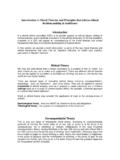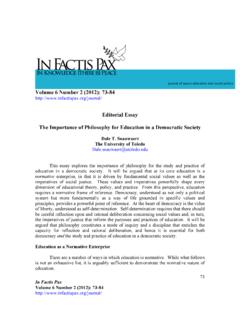Transcription of Guide to Ethics & Morality - On the Wing
1 1 Guide to Ethics & Morality Principles, Problems, and Questions What are Ethics ? What is Morality ? How can one behave in a moral manner? These are among the most difficult and most interesting questions which face people of any age. Today, however, with advancing technology, difficult moral situations come upon us faster than we can even create the questions, much less find the answers. This FAQ will address both general issues and specific questions in the area of moral philosophy. Table of Contents NATURE OF Ethics AND Ethics , MORALS, AND DESCRIPTIVE, normative AND ANALYTIC DEONTOLOGICAL, TELEOLOGICAL AND VIRTUE Ethics AND Morality : WHO CARES?..7 DESCRIPTIVE normative Ethics : DESCRIPTIVE, normative AND DEONTOLOGY AND TELEOLOGY AND VIRTUE 2 Nature of Ethics What are Ethics and Morality ?
2 Ethics is the formal study of moral standards and conduct. For this reason, the study of Ethics is also often called "moral philosophy." What is good? What is evil? How should I behave - and why? How should I balance my needs against the needs of others? These are some of the questions asked in the field of Ethics , a branch of philosophy which has some of the most immediate and obvious consequences for how we live our lives. Ethics , Morals, and Values There are three principle types of values which humans can have: preferential values, instrumental values and intrinsic values. Each plays an important role in our lives, but they don't all play equal roles in the formation of moral standards and moral norms. Ethics : Descriptive, normative and Analytic The field of Ethics is usually broken down into three different ways of thinking about Ethics : descriptive, normative and analytic.
3 It isn't unusual for disagreements in debates over Ethics to arise because people are approaching the topic from a different one of these three categories. Thus, learning what they are and how to recognize them might save you some grief later. Ethics : Deontological, Teleological and Virtue normative ethical systems can generally be broken down into three categories: deontological, teleological and virtue Ethics . The first two are considered deontic or action-based theories of Morality because they focus entirely upon the actions which a person performs. The third, virtue Ethics , focuses upon what sort of person one wants to be. Who Cares? Why be concerned with moral theories and distinctions between different types of moral theories? Why bother with some of the difficult questions which are raised in metaethics?
4 Everyone is brought up with some sort of moral system, and it usually works out fairly well - isn't that enough? What's the point of bothering further? Ethics and Morality What are they? The terms Ethics and Morality are often used interchangeably - indeed, they usually can mean the same thing, and in casual conversation there isn't a problem with switching between one and the other. However, there is a distinction between them in philosophy which will be maintained throughout this FAQ. Strictly speaking, Morality is used to refer to what we would call moral standards and moral conduct while Ethics is used to refer to the formal study of those standards and 3conduct. For this reason, the study of Ethics is also often called "moral philosophy." Here are some examples of statements which express moral judgments: 1.
5 Dumping chemicals in the rivers is wrong and ought be banned. 2. It's wrong that our company is trying to avoid the regulations and it should stop. 3. He's a bad person - he never treats people well and doesn't seem to respect anyone. As seen in the above examples, moral judgments tend to be characterized by words like ought, should, good and bad. However, the mere appearance of such words does not mean that we automatically have a statement about morals. For example: 4. Most Americans believe that racism is wrong. 5. Picasso was a bad painter. 6. If you want to get home quickly, you should take the bus. None of the above are moral judgments, although example #4 does describe the moral judgments made by others. Example #5 is an aesthetic judgement while #6 is simply a prudential statement explaining how to achieve some goal.
6 Another important feature of Morality is that it serves as a Guide for people's actions. Because of this, it is necessary to point out that moral judgments are made about those actions which involve choice. It is only when people have possible alternatives to their actions that we conclude those actions are either morally good or morally bad. When discussing Morality it is important to distinguish between morals and mores. Both are aspects of human conduct and human interaction, but they are very different types of conduct. Mores are usually treated as "harmless customs," where "harmless" means that failure to follow the custom may result in a negative reaction, but not a very serious one. Such mores would include the time of day when meals are eaten and the proper form of greeting particular individuals.
7 Morals, on the other hand, involve much more serious aspects of how we behave and how we treat others. What this means is that failure to follow the dominant morals will result in a much harsher reaction from others - examples of this would include discrimination, physical abuse and theft. Another important distinction in Morality is that between standards, conduct and character. When we form a moral judgment, we are employing moral standards - principles against which we compare what we see in order to form a conclusion. Such judgments might be about particular conduct, which includes a person's actions, or it might be about a person's character, which includes their attitudes and beliefs. Ethics , on the other hand, involves the study of those standards and judgments which people create.
8 Ethics assumes that the standards exist and seeks to describe them, evaluate them, or evaluate the premises upon which those standards exist. This is where the field of Ethics is broken down into Descriptive Ethics , normative Ethics and Analytic Ethics (also called Metaethics). 4 The basic questions asked in Ethics include: What does it mean to be good? How can I differentiate good from evil? Are morals objective or subjective? Ethics , Morals, and Values How do they relate? One of the most important characteristics of moral judgments is that they express our values. Not all expressions of values are also moral judgments, but all moral judgments do express something about what we value. Thus, understanding Morality requires investigating what people value and why. There are three principle types of values which humans can have: preferential values, instrumental values and intrinsic values.
9 Each plays an important role in our lives, but they don't all play equal roles in the formation of moral standards and moral norms. Preference Value The expression of preference is the expression of some value we hold. When we say that we prefer to play sports, we are saying that we value that activity. When we say that we prefer relaxing at home over being at work, we are saying that we hold our leisure time more highly than our work time. Most ethical theories do not place much emphasis on this type of value when constructing arguments for particular actions being moral or immoral. The one exception would be hedonistic ethical theories which explicitly place such preferences at the center of moral consideration. Such systems argue that those situations or activities which make us happiest are, in fact, the ones we should morally choose.
10 Instrumental Value When something is valued instrumentally, that means we only value it as a means to achieve some other end which is, in turn, more important. Thus, if my car is of instrumental value, that means that I only value it insofar as it allows me to accomplish other tasks, such as getting to work or the store. Instrumental values play an important role in teleological moral systems - theories of Morality which argue that the moral choices are those which lead to the best possible consequences (such as human happiness). Thus, the choice to feed a homeless person is considered a moral choice and is valued not simply for its own sake but, rather, because it leads to some other good - the well-being of another person. Intrinsic Value Something which has intrinsic value is valued purely for itself - it isn't used simply as a means to some other end and it isn't simply "preferred" above other possible options.













